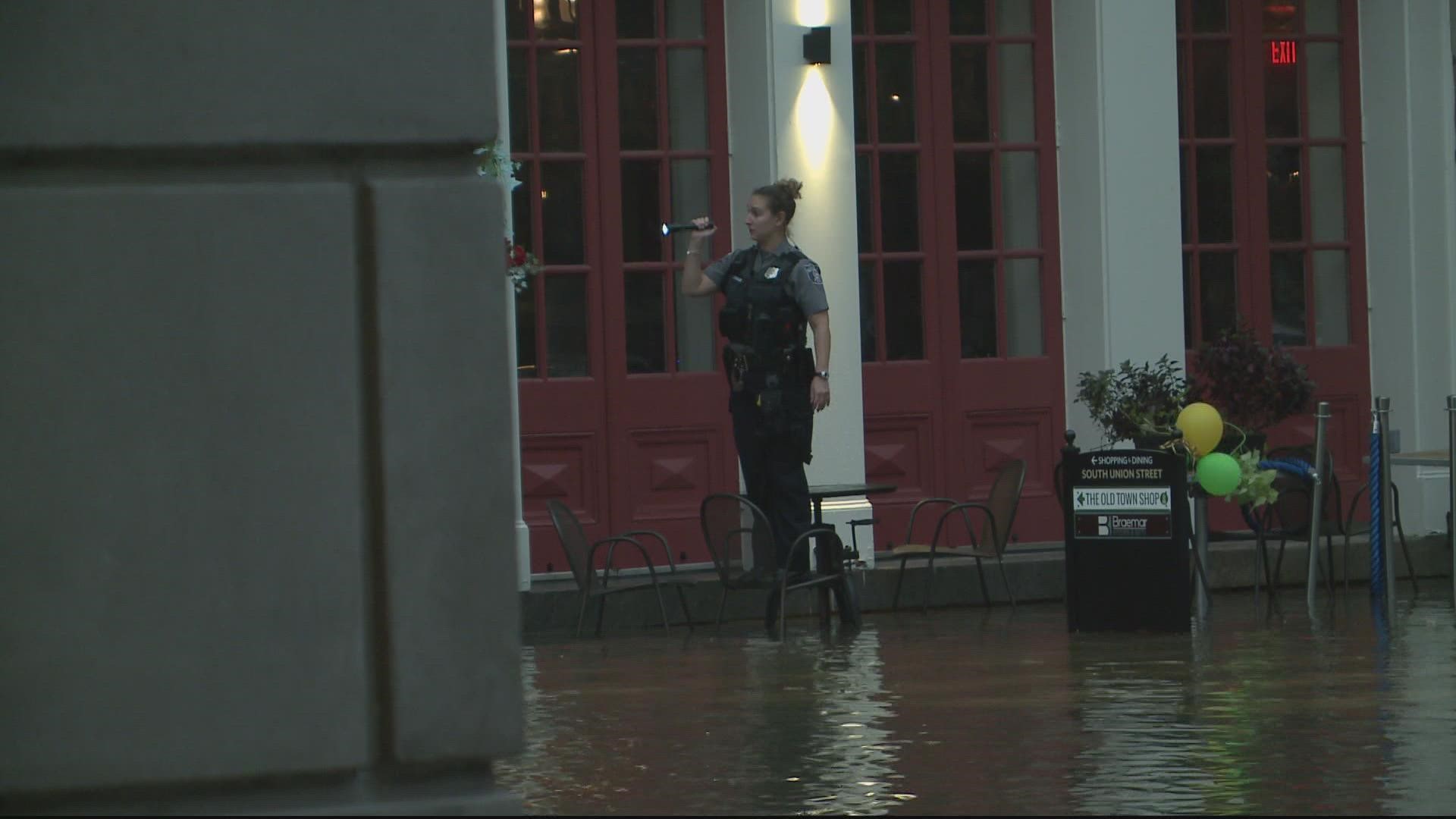ALEXANDRIA, Va. — As Virginia prepares to deal with possible “major” flooding along its coast, some climate activists are urging the Commonwealth to stay committed to a regional emissions reduction effort.
In 2020, the Virginia General Assembly voted to have the Commonwealth join the Regional Greenhouse Gas Initiative [RGGI].
Eleven states in the Northeast and Mid-Atlantic, including Virginia and Maryland, participate in RGGI. The goal of the initiative is to reduce carbon dioxide emissions from power plants within each participating state through a “market-based cap-and-invest” effort.
Essentially, it requires organizations that burn fossil fuels within RGGI states to pay a sum of money into a fund that helps people adapt to various climate-related issues.
In Virginia, money from RGGI goes toward the state’s community flood preparedness fund grant.
“The fund was established to provide support for regions and localities across Virginia to reduce the impacts of flooding, including flooding driven by climate change,” states the Virginia Department of Conservation and Recreation [VDCR]. “The fund will prioritize projects that are in concert with local, state and federal floodplain management standards, local resilience plans and the Virginia Coastal Resilience Master Plan.”
Flood relief efforts and mitigation strategies have become a point of focus in the Commonwealth as of late.
Major tidal flooding from a Noreaster over the Atlantic Ocean is threatening coastal communities like Hampton Roads. While Northern Virginia cities like Alexandria continue to deal with tidal flooding in neighborhoods near shorelines.
Virginia Governor Glenn Youngkin discusses his concerns with RGGI with 13NewsNow in Norfolk.
However, some political leaders have expressed frustration with RGGI.
Shortly after his inauguration, Virginia Governor Glenn Youngkin signed an executive order to have the Virginia Department of Environmental Quality re-evaluate Virginia’s participation in RGGI based on information that claims its results in higher costs for Virginia utility customers.
Then, in September, Youngkin’s administration filed a Notice of Intended Regulatory Action with the Virginia Register of Regulations to repeal the implementation of RGGI in Virginia. The measure, which will have future consideration from Virginia’s State Air Pollution Control Board, is subject to a public comment period that ends October 26.
Youngkin spoke with WUSA9’s sister station, 13NewsNow in Norfolk, about his opposition to RGGI two weeks ago.
The Republican governor said the initiative was misrepresented to Virginia representatives upon its rolling out.
“RGGI was sold by Democrat leaders as a market-based incentive system in order to bring down greenhouse gas emissions, [but] there’s nothing market-based about it,” Youngkin said. “There’s no incentive. A matter of fact, the cost of RGGI, which is set by other states, not from Virginia, is passed from Dominion, or the other utilities, directly to users with no choice.”
Furthermore, Youngkin said he would prefer Virginia fund conservation and flood resiliency efforts directly, instead of by a method that he says involves a “hidden tax.”
“It’s been implemented in a way that’s totally inconsistent with the way it was sold and it is simply a tax on energy usage,” he said.
Virginia’s current contract with RGGI ends December 31, 2023.
In August, Virginia’s Acting Secretary of Natural and Historic Resources Travis Voyles also petitioned the State Air Pollution Control Board as to why the Commonwealth should end its participation in RGGI.
“This decision to remove Virginia from RGGI is part of a real plan to reduce energy costs, make our energy economy be competitive, bring new investment into the state, while also conserving our Commonwealth treasured natural resources,” he said. “It is evident that RGGI is a barrier that is, and will continue to, be preventing Virginia from attaining this energy freedom.”
Money from RGGI has continued to flow to Virginia communities despite the Youngkin administration’s displeasure with the initiative.
Last week, the VDCR announced $13.6 million worth of awards for numerous Virginia communities from the Virginia Community Flood Preparedness Fund.
The cities of Alexandria, Fairfax, King George County, and the Northern Virginia Regional Commission were some of the local entities to receive money through this latest round of grant funding.
Jesse Maines, Chief of Alexandria’s Stormwater Management Division, said his city has received more than $5.5 million worth of flood preparedness funding thanks to RGGI.
“They range from a large waterfront project to addressing tidal flooding, to other projects that are local in the neighborhoods to address urban flash flooding that we've seen from these climate change-induced storms,” he said.
Alexandria has received flood grant funding to establish an inlet program, create a resilient stormwater capacity and green streets project, and design a waterfront improvement project, among other things.
“[RGGI funds] helping us accelerate these projects, so we can deliver them faster,” Maines said. “We have these projects on the books for funding later on. But, these grants are allowing us to deliver them faster so the community will see the positive impacts of these projects to reduce flooding.”
Mike Tidwell, founder and director of the Chesapeake Climate Action Network, said he is concerned by the Youngkin administration’s stance on RGGI.
“This is life or death. This is not theory,” he said. “And, we have to address [climate change]. We can wish that it would go away, but it's not going to go away. And, coastal Virginia needs billions of dollars to address this issue. The Regional Greenhouse Gas Initiative could provide potentially hundreds of millions to get started on the kind of life-saving measures we know we need.”
Tidwell added he is not confident Youngkin’s administration has a backup plan for resiliency efforts if funding from RGGI were to go away.
“If you change that, then who's going to pay for it? How are they going to pay for it? And, is anybody going to pay for it?” he said. “And, then, the people in Buchanan [County] want to know the answer. People in Norfolk want to know. And, the people of Alexandria want to know.”

